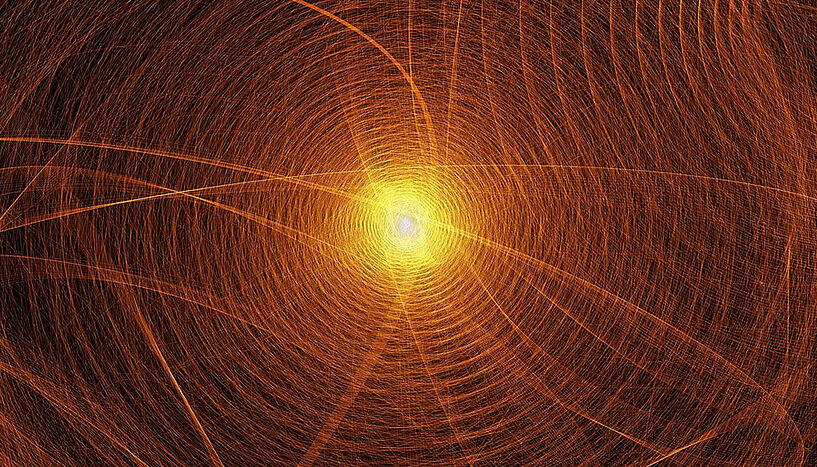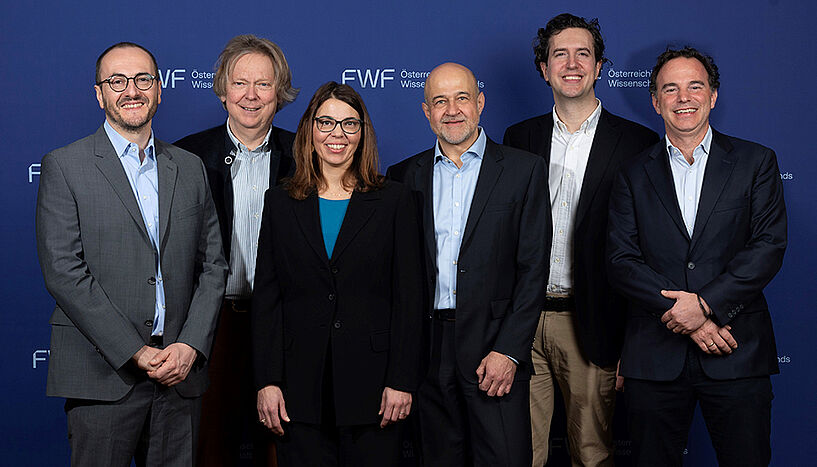Exploring the foundations of the quantum world
14. August 2023Cluster of Excellence: Quantum Science Austria
Austria has provided the foundation for a quantum revolution already once before. In a new Cluster of Excellence, a team of researchers including scientists from the University of Vienna join forces to solve unresolved mysteries from the world of quanta and to jointly drive innovation. Smells like revolution indeed.
Addressing fundamental issues and reflecting on matters that will be important in future – these are the objectives of the new Cluster of Excellence Quantum Science Austria. Researchers from six institutions in Vienna, Klosterneuburg, Innsbruck and Linz join forces to address three key topics: the quantum physics of space, time and gravity; the role of quanta in information processing and the interaction between various quantum systems.
"We invest in the fundamental questions and thus reflect on matters that will be important in future." Markus Aspelmeyer
The researchers aim to jointly resolve the greatest mysteries in the world of quanta using well-controlled model systems based on trapped ions, ultracold atoms, systems with long-range interaction, supraconducting quantum circuits and nanoscopic solid-state systems.
What is the excellence initiative?
With the excellence initiative excellent=austria, Austria is opening a new chapter in basic research: Five clusters of excellence will launch cooperative projects at an unprecedented dimension at eleven locations from the summer of 2023 onwards. Researchers involved in the initiative have the opportunity to contribute outstanding research achievements in individual fields as well as in interdisciplinary areas and to firmly position this field of research at the highest international level in the long term in Austria. The University of Vienna is involved in all five Clusters of Excellence.
Austria as driver of the quantum revolution
"We still have many unresolved questions in the field of quanta," says Markus Aspelmeyer, member of the Board of Directors of the new Cluster of Excellence. "Some of these questions can only be answered by means of the expertise in quantum research in Austria. We have a fascinating mix of tradition and disruption here," explains the physicist from the University of Vienna. The best proof is the second quantum revolution – the development of modern quantum science at tremendous speed – which would not have been possible without the ground-breaking contributions from Austria: "The majority of quantum experiments were conducted in Austria and have been a strong driving force."
Other key researchers of University of Vienna's faculty of Physics are Markus Arndt, Caslav Brukner, Norbert Schuch und Philip Walther.
Impact of quantum research
"We are working on innovative concepts and ideas that will, in the long run, break the ground for new discoveries and may result in the development of new technologies," says Aspelmeyer on the added value of the research cooperation. Start-up companies that turn findings into reality are a good example for this. Aspelmeyer co-founded Crystalline Mirror Solutions (CMS), a spin-off of the University of Vienna, as well as the Vienna Center for Quantum Science and Technology (VCQ). Today, CMS is a world-leading manufacturer of high-precision optics for laser systems. We can look forward to the innovations developed in the new Cluster of Excellence.
What's next in quantum physics
Join us on a tour of the think tanks and laboratories focusing on quantum physics at the University of Vienna and get a glimpse of the future of quantum research.
Board of Directors and participating research institutions
- Gregor Weihs (Director of Research, University of Innsbruck)
- Markus Aspelmeyer (University of Vienna)
- Francesca Ferlaino (Austrian Academy of Sciences)
- Johannes Fink (Institute of Science and Technology Austria)
- Armando Rastelli (University of Linz)
- Oriol Romero-Isart (University of Innsbruck)
- Hannes-Jörg Schmiedmayer (Vienna University of Technology)
Austrian Science Fund (FWF) funding amount: 21 million euros
About Markus Aspelmeyer
Markus Aspelmeyer investigates the quantum optical control of massive mechanical systems, the development of new quantum technologies for information processing as well as new experiments at the interface between quantum physics and gravitation. He has been a professor at the Faculty of Physics of the University of Vienna since 2009 and has received numerous awards for his contributions to quantum research, including an ERC Grant and the START Prize. What drives the quantum expert: genuine curiosity. “Conducting experiments that have never been conducted before, not knowing what will come of it, is absolutely fascinating,” says Aspelmeyer.


